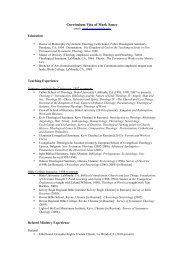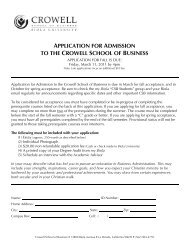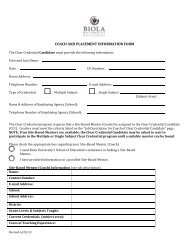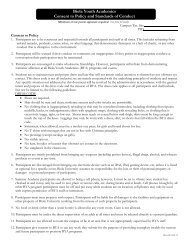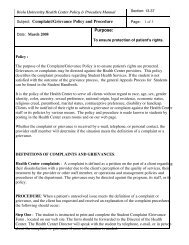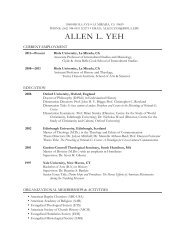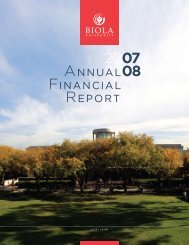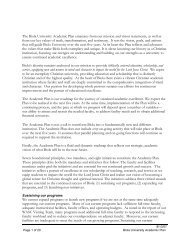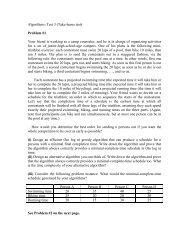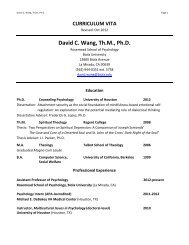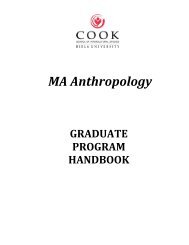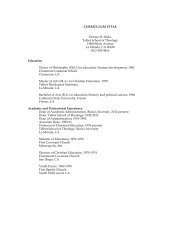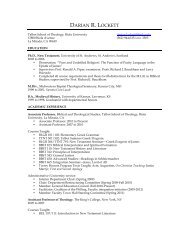Create successful ePaper yourself
Turn your PDF publications into a flip-book with our unique Google optimized e-Paper software.
tion models, self-concept, non-verbal messages, stress and<br />
other strategies that will assist the Christian leader in develop-<br />
ing interpersonal communication skills and the productive<br />
use of conflict.<br />
t h e o l o G y & C h U r C h h I s t o ry<br />
ttts 566 The Doctrine of man & sin ...................................................3<br />
Roger R. Nicole, Th.D., Ph.D.<br />
The Reformed Doctrine concerning the origin of humanity<br />
and the influx of sin into the world is explained. The course<br />
addresses the issues raised by the theory of evolution as it<br />
relates to the creation of humanity. It explains the effects of<br />
the Fall in the Garden on our current condition. In addition,<br />
detail is given to the promise of the restoration of our original<br />
image in the likeness of Christ.<br />
ttts 567 The Doctrine of salvation .....................................................3<br />
Roger R. Nicole, Th.D., Ph.D.<br />
The plan and order of salvation outlining the process from<br />
regeneration to glorification are discussed. Special attention is<br />
given to differing views and objections to the Reformed doc-<br />
trine on this subject, and evidence for both sides is carefully<br />
weighed. Specific topics include the question of the attain-<br />
ment of perfection in this life, the relationship of baptism to<br />
salvation, the Roman Catholic concept of justification, and the<br />
reasons for believing in the perseverance of the saints.<br />
ttts 568 The Doctrine of the Trinity ...................................................3<br />
Peter Toon, D. Phil. (Oxon)<br />
The doctrine of the Trinity is presented from biblical, historical,<br />
dogmatic and contemporary perspectives. Special atten-<br />
tion is paid to the formulation of the classic and orthodox<br />
doctrine of the Trinity in the fourth century at the Councils of<br />
Nicea (325) and Constantinople (381). The manner in which<br />
the doctrine developed in the East and West is also noted.<br />
Further, the commitment of the Church to the ontological<br />
Trinity (God-as-God-is-in-Himself ) as well as to the economi-<br />
cal Trinity (God-as-God-is-toward-us / the world) is explained<br />
and commended. Finally, a survey of recent attempts to<br />
present a modern doctrine of the Trinity (e.g., by Barth, Rahner,<br />
Moltmann, Pannenberg and “the feminist” Catherine Mowry<br />
Lucgna) is provided.<br />
ttts 570 survey of Church history .....................................................3<br />
Garth M. Rosell, Ph.D.<br />
The course is designed to provide the student with a basic<br />
introduction to the development of the Christian Church from<br />
its founding at Pentecost to the present day.<br />
ttts 571 The ancient Church ................................................................3<br />
Richard C. Gamble, Th.D.<br />
From the close of the New Testament in 95 A.D. to approxi-<br />
mately 600 A.D.; the church and the Roman Empire; ecclesi-<br />
astical organization; development of theology and dogma;<br />
Christian life and worship.<br />
ttts 572 The history of the Church to the reformation .............3<br />
Garth M. Rosell, Ph.D<br />
The course is designed to provide the student with a basic<br />
introduction to the development of the Christian Church’s<br />
doctrine, faith and practice from its founding at Pentecost to<br />
the time of the Protestant Reformation.<br />
ttts 573 reformation Church history ...............................................3<br />
W. Robert Godfrey, Ph.D.<br />
A study of the development of the theology, the piety and<br />
the churches of the Reformation against the backdrop of the<br />
social, political and intellectual character of the 16th century.<br />
ttts 574 The history of the Church since the reformation ......3<br />
Garth M. Rosell, Ph.D.<br />
The course is designed to provide the student with a basic in-<br />
troduction to the development of the Christian Church since<br />
the time of the Protestant Reformation to the present day.<br />
ttts 575 The history of Christianity in america .............................3<br />
John D. Hannah, Th.D., Ph.D.<br />
A study of the Protestant churches in America from colonial<br />
beginnings to the present with emphasis on the numerous<br />
influences that have forged the current religious scene.<br />
ttts 576 The Theology of Jonathan edwards .................................3<br />
John H. Gerstner, Ph,.D.<br />
An examination of the theology of Jonathan Edwards in<br />
detail. Taking a topical approach, the course covers Edwards’<br />
teachings regarding all the major points of systematic theol-<br />
ogy with particular emphasis on Edward’s unique theological<br />
contributions.<br />
ttts 577 The Theology of martin Luther ..........................................3<br />
Robert Kolb, Ph.D.<br />
The Theology of Martin Luther reviews the presentation of<br />
biblical doctrine according to topics in historical context. The<br />
presuppositions of his theology are set forth in his distinction<br />
of the two kinds of righteousness and the theology of the<br />
cross. Against this background Luther’s treatment of central<br />
Christian doctrines, particularly justification in the faith and<br />
the means of grace, are explored. Significant treatment is<br />
given to his understanding of life in human culture and<br />
20<strong>05</strong> – 20<strong>07</strong> C ATA LO G Talbot School of Theology 257<br />
society.<br />
ttts 578 The radical reformation ......................................................3<br />
Abraham Friesen, Ph.D.<br />
This course examines the history of the Radical Reformation.<br />
It follows a topical, chronological, and historical progression,<br />
covering the genesis of the movement, its relation to the



